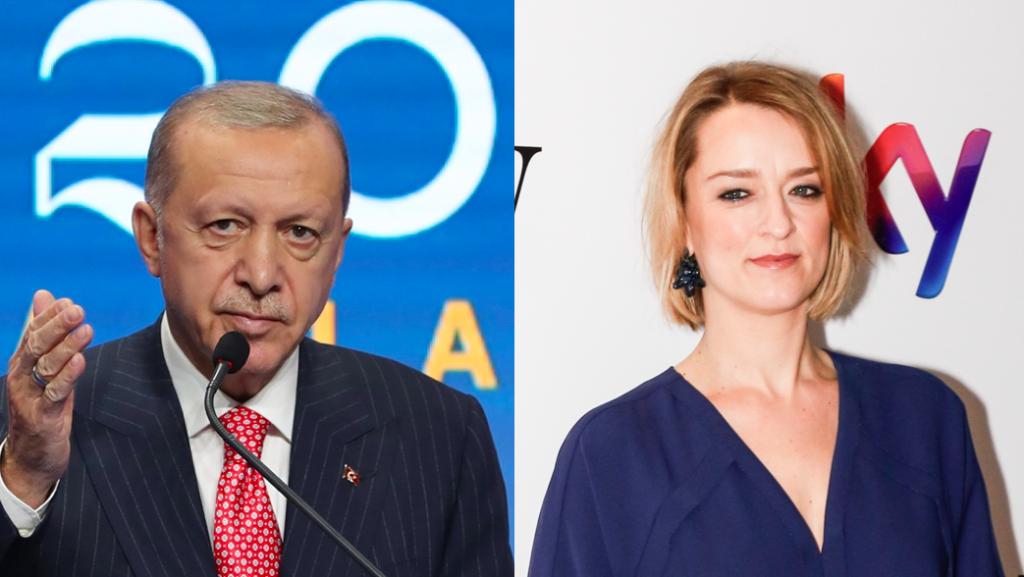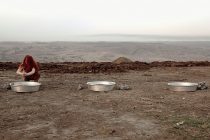A BBC report on Turkey’s environmental record has been criticised for using “out of date” information. Reporting from the COP26 Climate Change Conference in Glasgow, BBC Political Editor Laura Kuenssberg mistakenly placed Turkey in the same bracket as major polluters China and Russia, and also wrongly tweeted that “Turkey is one of the countries that has not submitted a plan for net zero”.
In fact, Turkey had ratified the Paris Agreement on climate change last month, while its track record on emissions and other pollution indicators places it below big polluters like Japan and South Africa, whose leaders also snubbed COP26, but were not mentioned by the BBC.
In a report for BBC News at Six live from the 2021 United Nations Climate Change Conference in Glasgow on Monday, 1 November, Kuenssberg stated that, “The leaders of some of the biggest polluters, China, Russia and Turkey haven’t shown, keeping much more than a social distance.”
Earlier in the day, the seasoned journalist had tweeted: “Erdogan now not coming after what sounds like some shenanigans over his attendance in Glasgow – Turkey is one of the countries that has not submitted a plan for net zero”.
Kuenssberg’s error about Turkey’s commitment to a 2053 net zero target was quickly pointed out by Twitter users.
Erhan Timur wrote: “Laura, your information is out of date, Turkey recently announced a 2053 net zero target. More information is coming shortly. Turkey has made HUGE investments in renewables with over 50% of electricity coming from renewable sources”.
Laura, your information is out of date, Turkey recently announced a 2053 net zero target. More information is coming shortly. Turkey has made HUGE investments in renewables with over 50% of electricity coming from renewable sources https://t.co/3K6Aa36IPl
— Erhan Timur (@timur_erhan) November 1, 2021
Dan Cunningham: “Didn’t Turkey submit an updated NDC yesterday with a 2053 net zero target? That’s what @climateactiontr says”.
Didn’t Turkey submit an updated NDC yesterday with a 2053 net zero target? That’s what @climateactiontr says: https://t.co/O72grJMwmc
— Dan Cunningham (@dancunningham) November 1, 2021
Fact Checker
The BBC Political Editor’s inference that President Recep Tayyip Erdoğan’s absence from Glasgow was a reflection of Turkey being one of the “biggest polluters” on the planet and wanting to put some “distance” between itself and a commitment to climate change was also very misleading.
First of all, the facts show that Turkey is not in the league of big polluters. A cursory check by even a novice journalist would have found that on multiple key surveys about the worst polluting nations, Turkey’s name simply doesn’t appear.
Political Editor Laura Kuenssberg makes misleading claims about turkey for BBC News at Six Report from COP26, 1 Nov. 2021
A United Nations report published in August of this year found that the ten biggest polluting countries per capita were Qatar, Kuwait, Saudi Arabia, Canada, United States, Germany, China, Spain, France and Thailand.
The full findings of the Intergovernmental Panel on Climate Change (IPCC) Working Group’s Sixth Assessment Report can be read here.
Turkey is also not among the worst producers of harmful CO2 emissions. The latest statistics about the twelve largest producers of fossil fuel CO2 emissions worldwide in 2019 (the most up-to-date figures available) by share of emissions shows China, USA, India, Russia and Japan in the top 5, followed by Iran, Germany, Indonesia, South Korea, Saudi Arabia, Canada and South Africa.
In another survey, created by the Financial Times just before the start of COP26, a searchable dashboard comparing countries’ emissions and climate pledges places Turkey in 17th position out of 193 countries globally. China and Russia, described by the BBC as the “biggest polluters” are in top five, along with the US, India and Indonesia. The UK is just behind Turkey in 19th position.
Turkey is at COP26, even if President Erdoğan isn’t
Another bizarre inference by the BBC was that somehow President Erdoğan’s absence from COP26 equated to Turkey being missing in action too.
The Turkish president had opted against attending the climate change conference after his requests for stricter security arrangements in Glasgow – on a par with those afforded to the likes of United States President Joe Biden – were refused by the Scottish National Party.
While the president’s absence was criticised by Turkish climate change activists and academics, such as Ümit Şahin, the co-ordinator of Climate Change Studies at Sabanci University’s Istanbul Policy Centre, it did not amount to Turkey failing to send a delegation.
COP 26 Glasgow…
İklim Değişikliği Zirvesi#COP26 pic.twitter.com/PB8QN8vsVJ— Prof. Dr. Mehmet Emin Birpınar (@Mbirpinar) November 1, 2021
Turkey’s COP26 team includes Murat Kurum, the Minister of Environment, Urbanization and Climate Change, and his deputy Prof. Dr. Mehmet Emin Birpınar who is also Turkey’s Special Envoy for Climate Change. They have been among the nations pushing for faster climate change and bigger commitments, a point underlined by Ümit Şahin in an interview he gave to Yesil Gazete.
In his COP26 daily updates for Yeşil Gazete, a Turkish publication dedicated to the environment, Şahin said: “China and Russia are always pointed out here. If Turkey attended this conference, which is at the top leaders’ level, then its name could have been mentioned among the other attendees. Now it will be mentioned among the non-attendees.”
Minister f Environment Murat Kurum speaking at COP26 in Glasgow on Turkey meeting the 2053 net zero target
1⃣ Cumhurbaşkanımız Sayın @RTErdogan‘ın 2053 yılı için ortaya koyduğu net sıfır emisyon ve yeşil kalkınma hedefimiz doğrultusunda iklim değişikliğiyle mücadelemizdeki kararlılığımızla, BM İklim Değişikliği #COP26 toplantıları için Glasgow’dayız. pic.twitter.com/tyHWK58PJv
— Murat KURUM (@murat_kurum) November 1, 2021
Speaking from Glasgow, Şahin acknowledged the importance of 2053 net zero target and ratification of the Paris Agreement, and urged Turkey to reposition itself more significantly at COP26:
“Turkey shouldn’t be associated with the likes of Russia, but it should show it belongs to the High Ambition Coalition (HAC). Turkey can join HAC, there is no obstacle. It would put us among the positive countries in the climate struggle. Turkey should reposition itself in a more progressive way.”
Şahin continued by reporting on the good work the Turkey delegation was doing in Glasgow:
“There was a discussion on the common time frames yesterday [Monday, 1 November] and Turkey was among the countries opting for five years, not ten. This is very positive. Because ten year would mean muddling around”.
The time frames are periods of implementation for countries in communicating their national climate plans highlighting climate actions (NDCs).
BBC’s anti-Turkish bias
The BBC’s coverage of Turkey’s climate change commitments and its false claims about its pollution record and the country’s absence at COP26 will strengthen the view among many British Turks that there is strong anti-Turkish bias in the newsroom of the British state broadcaster.
British Turkish Cypriots regularly voice their irritation at the BBC’s whitewashing of Cyprus history, where the conflict is erroneously presented as starting in 1974 when in fact it started in December 1963. The BBC narrative effectively wipes out a decade of attempted genocide against Turkish Cypriots and the need for Guarantor Turkey’s vital intervention, which the BBC labels an “invasion”, maximising the negative impression of Turkey’s role.
In one news report in January 2019, challenged by T-VINE at the time, the BBC referred to Turkish Cypriot police officers serving in Cyprus in the mid to late 1950s as “thugs”. The reference was subsequently deleted and the BBC apologised for using the offensive term. Twenty six Turkish Cypriot police officers were among the hundreds of people murdered by Greek Cypriot terror group EOKA between 1956 and 1959 – the period known as the Cyprus Emergency.

The BBC’s anti-Turkish bias is witnessed in coverage about more recent conflicts too, particularly on Turkey’s long-running battle with terror group the PKK both inside its borders and also in northern Iraq and northern Syria. BBC editorial often creates the impression that the Turkish government is waging a war against all Kurds, when in fact it is aimed at eliminating terrorism.
In October 2019, for example, a sensationalist BBC headline first claimed “Turkey’s Erdogan vows to ‘crush heads’ of Kurds”, deliberately misquoting the Turkish President. The headline then said “Turkey’s Erdogan vows to ‘crush heads’ of Kurdish fighters”.
What the Turkish President had said in a televised rally in Kayseri was: “We will start where we left off and continue to crush the terrorists’ heads”. There was no reference to Kurds.





